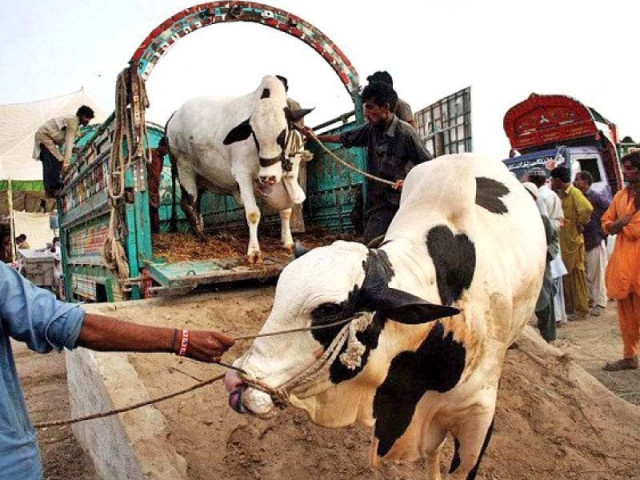Rs450b spent on Eid this year
10% more animals sacrificed this year against 2020

Around Rs450 billion worth of economic activities took place on Eid-ul-Azha in the country this year due to the improvement in the Covid-19 situation and the ban on Hajj.
About 10% more animals were sacrificed this year in comparison with the number in 2020 – indicating an increase in the circulation of wealth.
Circulation of wealth through business is essential for a country to survive and run its economy.
The business of transporting animals from markets to buyers' homes continued to run into billions of rupees.
According to an estimate, about four million goats and sheep and three million cows were sacrificed.
There has been a turnover of over Rs2 billion in the country on animal fodder. This business provides employment to fodder sellers as well as labourers.
After bringing the sacrificial animal home, money is spent on their decoration.
Around Rs25 billion were earned by butchers. The demand for professional and seasonal butchers to slaughter sacrificial animals reached its peak on Eid.
Scores of such professionals from rural Sindh and Punjab reached Karachi, the country’s economic hub, to earn a livelihood.
This year, Rs20,000-25,000 were being charged to slaughter cows weighing more than 185 kilogrammes on the first day of Eid, while Rs15,000 to Rs20,000 is the rate on the second and third days for same weight.
Read Sluggish market irks cattle traders
A total of Rs10,000-15,000 was charged for slaughtering animals weighing between 92 and 117 kilogrammes on the first day of the religious holiday.
Around Rs8,000 to Rs10,000 were charged on the second and third day of Eid.
Welfare institutions organising collective sacrifices availed the services of butchers coming from outside Karachi over the three days of Eid.
As many were unable to perform Hajj this year, there was an additional 10% sacrifices and the business of hides was estimated at Rs7.5 billion instead of Rs6.5 billion last year.
Similarly, over a sum of Rs1.5 billion was spent on the transportation of cattle.
The practice of ijhtemai qurbani or communal sacrifice also peaked by 20 to 30% this year, as opposed to buying separate animals.
Per Islamic jurisprudence, a single cow, ox or camel has seven portions, which means that the animal can be jointly sacrificed by seven persons.
As of the second day of Zilhaj, most mosques and seminaries across Karachi had closed their bookings for communal sacrifice, while a few neighbourhood committees and welfare organisations were still accepting reservations.
In addition, certain organisations had also introduced the facility of online sacrifice against the backdrop of Covid-19.



















COMMENTS
Comments are moderated and generally will be posted if they are on-topic and not abusive.
For more information, please see our Comments FAQ